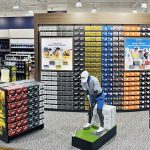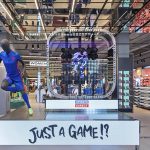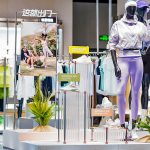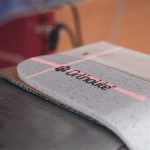It’s never good when the chairman of the Board of Directors starts his quarterly investor letter with, “Another struggling quarter.” However, that is exactly how Martin Nordin, chairman of Fenix Outdoor International, described the 2025 fiscal second quarter, which ended on June 30. The word “challenge” and its variations were used even more in the second quarter report for the parent company of Fjällräven, Royal Robbins, Hanwag, and Devold of Norway, as well as the outdoor brand and retailer Frilufts. In comparison, the keyword for Q2 2024 was “disappointing.”
The company has not reported a positive sales quarter since the first quarter of 2023.
“The second quarter did not come in as expected and was full of challenges,” Nordin continued with his opening comments accompanying the release of the company’s second quarter Interim Report. “The specialist outdoor retail market is still facing some challenges. The weather made the quarter volatile from a sales perspective; furthermore, price pressure from web dealers offering discounts from day one on new products.”
Nordin stated that Global Sales and Brands were also impacted because Fjällräven, due to market unpredictability, purchased fewer goods for reorder, resulting in a shortage of goods for direct orders.
“This means that the market has changed,” he noted. “It seems that dealers are depending more on reorders than before due to the market’s unpredictability, and we must change accordingly and thereby slightly increase the inventory risk.”
He added that the company also had a lower inventory of “old goods” this year, which he said meant they were not selling out through many of their channels as much as they did last year.
The U.S. market experienced a decrease in sales, but, like in Europe, the decline primarily occurred in the Wholesale segment. The lower direct-to-consumer sales were reported to be up on a like-for-like (comparable store) basis, especially in some key areas.
Nordin reported that the bottom line in North America improved somewhat due to the cuts implemented in 2024. The weaker U.S. dollar was also called out as affecting sales reported in euro (€) currency terms.
Net sales for the quarter amounted to €144.9 million in Q2 2025, compared to €149.6 million in Q2 2024, a decrease of 3.1 percent.
The company’s consolidated operating result was reported as a loss of €7.2 million in Q2, compared to a loss of €6.5 million in Q2 of the previous year. It was reported to be down primarily because the recently acquired Devold business was showing a seasonal loss that was not comparable to the numbers in Q2 last year. They were, however, said to be better than last year. Fenix agreed to acquire 65 percent of Devold of Norway AS shares in early March 2025.
The loss before tax for the period was €9.4 million in Q2, compared to a loss before tax of €7.4 million in Q2 2024. The net loss for the Group was €10.0 million, compared to a loss of €7.7 million in Q2 2024. The loss per B share amounted to €0.72 in Q2, compared to a loss of €0.56 per share in Q2 2024.
Brands and Global Sales
The company reported that Brands and Global external sales were relatively stable, with a total decrease of 1.6 percent y/y. OPEX was reportedly on the same level as last year.
Brands
The increase in external sales was attributed to the transfer of Fjällräven’s wholesale operations in the USA and Canada from Global Sales to Brands during the last quarter, as well as to the acquisition of Devold. The lower internal sales negatively affected the gross and operating profit. The strong sales to Frilufts in Q1, sold by Frilufts in Q2, resulted in a positive release of internal profit in stock accounted in common. The total lower sales of the Brands segment were also driven by the weaker U.S. dollar. The DTC business experienced a decrease, especially on the web; however, last year’s web sales included a boost due to the clearance of goods, which was not necessary this year, as our inventory is more accurate.
Global Sales
The European portion of Global Sales decreased by 6.0 percent, driven by the reorder situation. Asia was further hit by slowdowns in South Korea and Taiwan, with both countries experiencing decreases in both their local currency and the Euro. On the positive side, the wholesale business to the rest of Asia was up, as was our Chinese operation, which showed growth in both sales and profits in local currency. However, due to the RNB’s connection to the USD and accounting rules on JVs, it appears as a loss in our accounting.
Frilufts
Sales in the Frilufts operation increased by 1.5 percent, from 82.1 million to 83.5 million. This was driven by increases predominantly in Norway, Finland and Sweden. These markets were less affected by the weather, but the market was volatile. In terms of results, this led to a positive impact on profitability, primarily in Germany, driven by lower costs. The Norwegian business is showing reasonable improvement but still has a way to go.
Direct-to-Consumer (DTC)
Brick-and-mortar sales decreased from $77.8 million to $ 73.8 million, a 5.1 percent decrease. Digital sales decreased from $ 30.7 million to $ 28.3 million, a 7.9 percent decrease. Considering the closure of six shops, the data show that brick-and-mortar sales performed even better in the quarter than digital sales. The challenges are that the primary driver of digital traffic/sales is discount/red prices, which we use restrictively. On the good side, the company’s brands outperformed many of the external brands in Frilufts. The company believes, therefore, that there is a good chance its brands are performing better than the market as a whole.
Outlook
Nordin said that expectations for the third quarter look good. “There is a more than solid order book in Brands and Global Sales this year,” he noted. “However, given what we just experienced during Q2 as well as last year, weather and the relatively weak economy may jeopardize the situation. I therefore once again refrain from making any predictions.”
There are also some challenges. “We are facing an unpredictable situation in the US due to the trade and customs discussions. We are therefore still not able to finally set prices for summer 2026 and even though agreements are politically agreed upon for some of our supply markets, it is still not confirmed with instructions for the customs offices.
“What are we doing? I have mentioned in earlier letters that we have been investing in a new warehouse operation in Ludwigslust, and we are almost finished and expect to see positive effects on the costs under Q3 and Q4. We are also launching a new ERP system for Brands and Global Sales during H2 2025, which will enable us to improve operational efficiency. Besides that, we are also expecting positive effects from facilitation of our part ownership in Viomoda for closer to home production in 2026. We are also implementing further savings and efficiency programs, and we have already seen improvements as we have started seeing effects in this quarter on a like-for-like basis.”
Image courtesy Royal Robbins/Fenix Outdoor Int’l AG
















